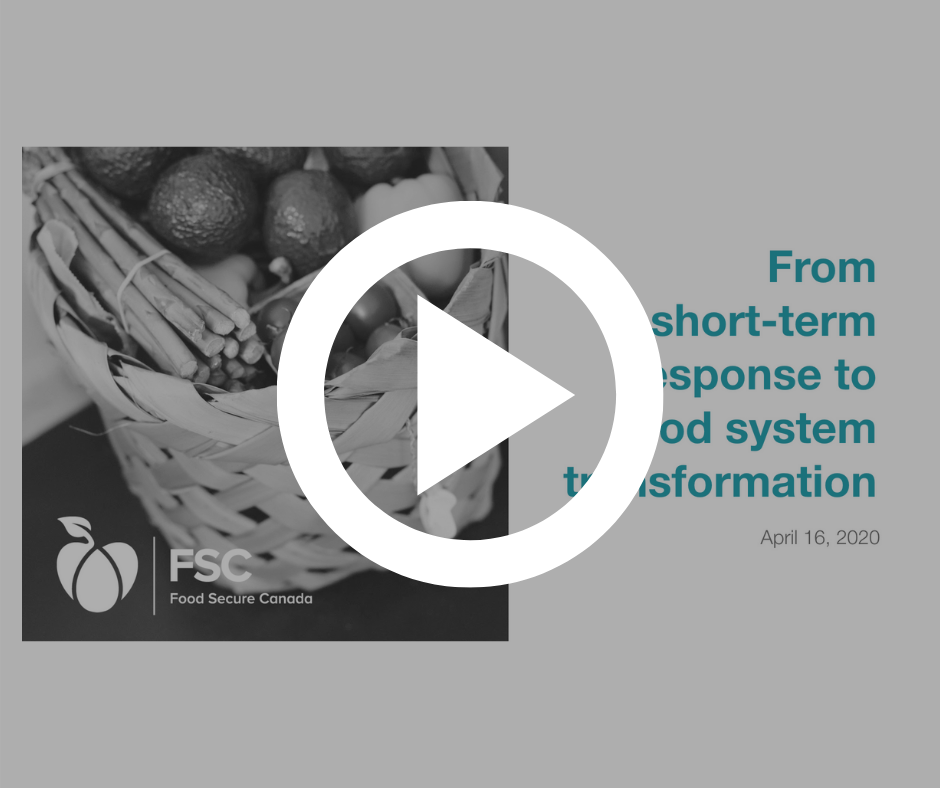Recap: From short-term response to food system transformation
TUESDAY APRIL 21, 2020 –
COVID-19 has brought into focus the weaknesses in our food system, and as governments of all levels roll out policies and programs in response, it is an important moment to push for transformative change. Where is the momentum right now, and how can we use it to build a better food system in the long-term?
That’s what we asked our panelists in last week’s webinar on moving from Short-Term Response to Food System Transformation. Furthermore, FSC Executive Director Gisèle Yasmeen asked, “how can we transform our food system out of this crisis in a way that helps us meet longer-term goals, such as the Sustainable Development Goals? For example, SDG 2 has the goal of ending hunger by 2030 as well as responding to improved nutrition and promoting sustainable agriculture.”
Across New Brunswick, Laura Reinsborough of Food for All NB highlighted the power of collaborating across the province, and prioritizing local producers to feed the community. She emphasized that as we respond to an emergency situation, we need to do so in a way that enforces long-term resiliency.
“It is early in these stages to see what the long term food system’s transformation might be. I don’t believe that any transformation from this moment is inevitable, I believe that we have to be very intentional.”
– Laura Reinsborough, Food for All NB
Stuart Oke from the National Farmers Union and Rooted Oak Farm talked about the existing challenges in farming, where farm succession, supports for sustainable and local supply chains, and financial viability have been issues for decades.
"There’s certainly a real short term need to help protect farmers and our food system now and that’s really important to get right, otherwise we won’t have a medium and long term transformation to talk about. Providing that we can get that short term economic need taken care of, the medium term is certainly investing in that infrastructure which will allow local food systems to thrive and prosper.”
– Stuart Oke, National Farmers Union
Next, Nick Saul of Community Food Centres Canada said that Canadian society was already deeply unjust before COVID-19. As unemployment grows and there is a flurry of investments to help vulnerable groups such as lower wage workers, he’s interested to see the shift in collective consciousness.
“The current moment of collective anxiety and vulnerability give[s] us a chance to talk about a different kind of society that values people and the planet ahead of profit and the commodification of virtually everything in our lives.”
– Nick Saul, Community Food Centres Canada
Speaking from the perspective of unions and labour, Elizabeth Kwan from the Canadian Labour Congress said that the present crisis brings into sharp relief the importance of protecting essential workers, including migrant workers who are especially vulnerable. Beyond ensuring they have support during quarantine, she urged us to look at the possibility that migrant workers could be allowed to stay in Canada and become part of a stable workforce.
“It is very important for the workers to be protected, because what’s good for them is good for everybody else.”
– Elizabeth Kwan, Canadian Labour Congress
While schools are currently closed, Debbie Field of the Coalition for Healthy School Food spoke about how school food programs have quickly adapted and are now an essential part of feeding children and their families (read more from the Coalition here).
“We’re the only G7 country without a national school food program, and really one of a few countries in the global South and North that doesn’t try to address the question: ‘how will children learn if they’re not well-fed at school.'”
– Debbie Field, Coalition for Healthy School Food
To end, Jessica McLaughlin from the Thunder Bay & Area Food Strategy called in live from the front lines, where she was distributing good food boxes with community organizations. She emphasized the need to give autonomy back to communities, especially Indigenous ones, allowing them to determine what their food systems look like.
“Really giving that autonomy back to First Nation communities to be able to determine their own food system is something that we’re really hoping will come out of the crisis.”
–Jessica McLaughlin, Thunder Bay & Area Food Strategy
To hear the full discussion, see the webinar recording here.
See the a list of policy proposals from the food movement across the country. If you have proposals to add, please email susan@foodsecurecanada.org.


